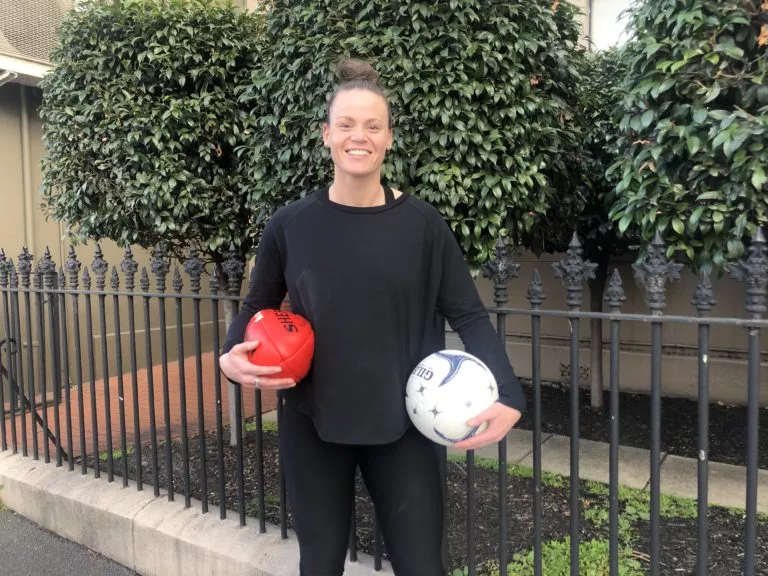As Sarah Last explores her own family’s Indigenous heritage, she is helping to spread the netball word among different cultures – including those of the international kind.
For almost a year, Last has worked as a Diversity and Inclusion Coordinator at Netball Victoria, combining a VFLW career with Richmond with a lifelong love of netball, the other sport the relocated country girl grew up playing in Wedderburn, past Bendigo.
Having initially moved to Melbourne when drafted by Carlton’s AFLW team in 2016, the Health Promotions graduate gained some off-field experience working in the community department at Princes Park, and has revelled in her full-time position leading netball programs within culturally and linguistically diverse communities.
“I can relate to the positive experience that sport’s given me – the opportunity to play netball, tennis, basketball, footy, whatever, it’s always been there and it’s been my decision what I play,’’ Last says.
“But what I’ve learnt over the past few years and especially in this role is that participation is something that’s not available to everybody, and that can be for a range of reasons.
“It could just be that they don’t know what’s out there, or they can’t access facilities, or it could be that there’s a language barrier. So one of my main roles is giving people opportunities to participate – and then whilst they are participating, becoming better leaders or developing their social skills.’’
She cites the example of the introductory program run for young adults at the Box Hill Institute, or the visit to an Islamic school in the northern suburbs. Awareness is the first step, “then obviously we try and link them into their local clubs and associations as well, which is really important for the pathway’’. And also for integration.
Last’s work with Indigenous communities has struck a personal chord with the 25-year-old, through a family lineage that runs through her maternal grandmother Mavis Jackson’s side and includes great grandfather Paddy Hogg, a renowned paddle-steamer captain on the Murray River in the mid-1900s.
Having long been aware of her ancestry, Last was only prompted more recently, to dig down into the roots of the family tree. And it seems the fact that records range between sketchy and non-existent have made it quite the excavation.
“I still don’t really know a lot about it, but it’s something that I’m exploring and Mum and I in particular are trying to really knuckle down and learn about our history and our culture,’’ she says.
“I think it’s so interesting. And it really makes me extra passionate about the work that I do, because it doesn’t matter if it’s Indigenous… the people I’m working with might be experiencing netball for the first time, but they have their own culture and I love learning about what matters to them.”
A favourite project was working with Richmond’s Indigenous Korin Gamadji Institute and, through that, artist Ky-ya Nicholson-Ward, on the design of the Melbourne Vixens’ dress for Suncorp Super Netball’s Indigenous round, then travelling to Brisbane for its unveiling in the match against the Firebirds.
“It was a really amazing experience from day one – to meeting with Ky-ya and then watching her artwork develop and then finally being printed on the dress, and then seeing it out there on the court.’”
Firebird Jemma Mi Mi and West Coast Fever injury replacement Beryl Friday are two Indigenous players on team lists for last weekend’s final round alongside numerous multicultural players competing at the elite level.
“We have lots of Indigenous and multicultural communities playing netball, through my role at Netball Victoria we continue to work with all communities to give opportunities and support participation”.
“It’s an area that we’re definitely working on, and building in. But it takes time.’’
Last believes her own sporting experiences have been helpful in a career sense, which in turn has helped to broaden her own horizons, for if it was not until she traded farm life in Fiery Flat for a stint in the big city that she even became aware that netball is played year-round.
“Having that elite experience does give you a different perspective and appreciation for what sport can do and where it can take you,’’ says Last. “I love sport, obviously, and I’m very grateful for the opportunity- for me, and what it can give other people, too.’’
Written by Linda Pearce
